CLICK ME
Menu
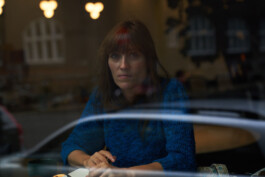
Christina Rosendahl is all in. A film director for 25 years and chairman of the Association of Danish Film Directors, Rosendahl is an avid exponent of her industry. She knows what she wants and exactly how to get it. She grew up in a violent and abusive home, and has since spent her life transforming that trauma into defining, positive aspects of her professional self. Here, she talks about integrity, wage negotiations, and the balancing act between fully committing yourself to the work in front of you while constantly worrying about what comes next.
When did you know that you were good at film?
“It was during a very specific class in 1995 when I was enrolled at the European Film College. In their cinema called Store Bjørn (Big Bear). We had been working on our own documentary projects. I did an experimental horror film about how a group of geese was slaughtered before Christmas. It was very violent and graphic. Our teacher was the legendary film director Henning Carlsen, and I knew my film was on the edge because it was so experimental. But he gave a speech for me in front of the entire school, where he praised my film for its engagement and originality.”
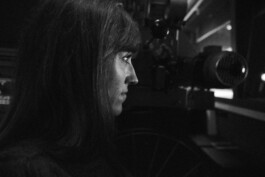
Did it surprise you?
“Up until then, I’d never been vocal about my desire to make films to anyone other than myself. I was still very much trying. But his appreciation made me realize the true value of what I was able to create.”
How did you react?
“I was frightened.”
Why?
“Because this made me realize that I had to stand by a promise to myself to work in this direction.”
I would have guessed that you’d be happy, not frightened?
“I grew up in a family with violence and alcoholism. Standing outside and looking in on family members trying and failing to handle their lives makes you really good at being the victim. The spotlight is never on you, you become a silent person without vigor. This was the first time in my life everyone looked in my direction. A completely new situation for me. I was happy and proud, of course, but primarily frightened.”
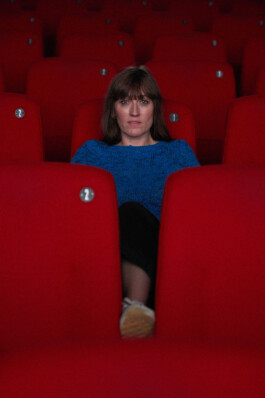
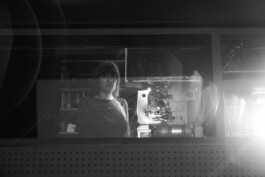
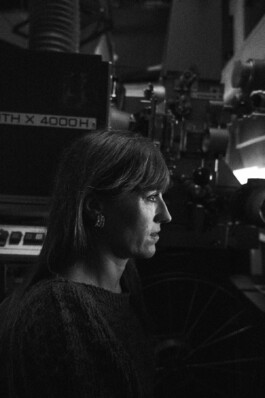
“I want my work to be ambitious enough to touch the entire world.”
– Christina Rosendahl

What did the situation offer you?
“A responsibility to handle my own life.”
That was 25 years ago. How’s work today?
“Fundamentally very, very great. Like every other film director I struggle with the fact that I never have a pipeline of work for more than a year tops, and all the financial hardships that come with that. But my work enriches and inspires me.”
Has it always been like that?
“I’ve been through a process that basically led to a paradigm shift in the way I work. The process was about what really drove me when I got up in the morning. My vision. And it became very clear to me that I should wipe everything in my worklife that didn’t feel engaging.”
How does that show today?
“I have nothing in my life of what makes people stressed. When you spend time on something that doesn’t add value, you burn out. To allow yourself to consider what the actual reason you go to work every day is very powerful.”
And what did you consider?
“A good work life for me is about integrity: To honor my word, to make sure that what I feel is also what I say and do. Integrity has always been hard for me. In my childhood I kept so many secrets and so many things went untold, so this has been huge for me.”
How so?
“A short back story: I believe there are two ways of dealing with your work life. One is to let others lead you: Your film is coming out, you are asked to give talks, go on tv, be active in organisationz and so on, and you just go with the flow and follow along. Another is the lead the way yourself: Define your ideal and your vision, and use it as a filter whenever someone calls. “Will this get me closer to my goal?” If yes, proceed. If no, avoid.”
You choose the latter.
“Yes. And the first time I actively did it was during a wage negotiation for a film. The normal way is that the producer has a budget, and then you fight about it: You want more, they want to pay less. I approached it differently. I did hours and hours of prep work: Calculated how much of my time and effort this film would require, took into account what I considered I was worth, and what the total budget of the film was. I presented my suggestion to the producer, and my fee was actually lower than the budget suggestion.”
And you stood on it?
“Absolutely. They thought I was crazy. But it was important for me to prove a point to myself.”
What did it do to you?
“I could feel my integrity in full effect. And then I got an incredible amount of respect from the team.”
Have you tried it the other way around? Where your number was higher than the producer’s?
“Yes. And because my preparations were so thorough, I also got my way.”
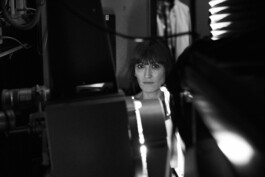
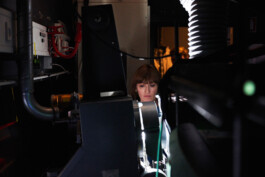
You have been involved in lots of projects over the years. Do you recall a time where things didn’t go as planned because something was in conflict with your vision?
“Yes. My second film. The first one went well, so we developed the next one. The funding was secured except for the very last part, and we were ready to roll. Two days before we went into preproduction we lost it. I got the message on a Friday and we were supposed to start working the following Monday.”
What did you do?
“I had to call everyone and tell them the news. The actor Kim Bodnia said to me: “Let’s fucking do it anyway.” In hindsight, we should have followed his advice. Should have fucking done it anyway. But I didn’t dare. And it hurts me to this day.”
Why didn’t you do it?
“I was afraid to be persona non grata in the established film production industry. I would be her that would never be recognized. And I wanted to become a part of that industry, of that system.”
Why?
“Because in Denmark we have a very distinct way of becoming a film director. You study. You develop your stories. The Danish Film Institute supports your work. If you want a professional and recognized career, that’s the way to go. Some would call it a convention. I like to stand in opposition to conventions.”
Is that possible?
“Yes! Just look at Nicolas Winding Refn. He is a prime example of someone who goes against conventions. He turned down his spot at the film school because he funded enough money to make his film Pusher instead. Outside of the system, outside of the conventions. His career has skyrocketed since then.”

Making a film is a long, demanding process where you constantly have to keep your eyes on the end product while dealing with day to day challenges. A recording day is expensive, so off-days are not allowed. How do you manage to stay focused during those long periods?
“My entire childhood was about life and death. Am I surviving today? Is my family? Will someone get killed? I have come to realize that I can resist a life-threatening amount of pressure over long periods of time. That’s one thing. Another thing, as I mentioned earlier, is that I’ve created methods for myself to avoid stress and only follow my own path instead of one that others dictate.”
How do you invest in yourself to become a better professional?
“I allow myself to say no to projects, even though they are well paid, because they do not align with my vision. I’m not able to create a massive body of work because I primarily do my own things. Develop ideas from scratch and so on. It’s a great sorrow of my work life that I don’t create more. I would love for the processes to be faster”
But that’s not possible, I guess?
“Yes it’s possible. But not for me.”
It’s like the saying that nine women are able to give birth to a child in one month? Things take time.
“Exactly. There’s a rather long process in my work, and it has to do with my weaknesses. People who work for Netflix are work for hire. I’m only involved with projects where I have final cut on everything.”
How do you deal with the pressure of not having a stable income?
“I have created a business model where I’m chairman of the Association of Danish Film Makers one third of my time. And then it’s from project to project, and just believing that the next one will always show up. I have not received unemployment benefit from the state for 15 years.”
What’s the most important thing you know about yourself in terms of work?
“That everything is possible. I want my work to be ambitious enough to touch the entire world.”
Are you always the one to boost the ambitions of a project?
“Not at all. I love when I sense other people’s ideas and ambitions. It doesn’t always have to be about me.”
But you have a big ego, right?
“Ha ha.”
Let me rephrase. Does one need to have a big ego to become a great film director?
“I think so, yes. But I think you need a similar amount of empathy unless you want to become a shitty leader that creates shitty stories. Your ego may serve as a driving force, but you need to be able to understand what motivates people. In my childhood it’s been a survival strategy to understand people’s feelings in order to affect situations in a peaceful direction.”
Are you confident about the direction in which your work life is going?
“Yes and no. If you look at other directors, they struggle. It’s hard work, and I’ve been lucky to be part of good things and good projects. But I have a constant chat with myself about gender. There is still so much disparity financially and when it comes to attention. I’m able to go only so far, and that’s because I’m a woman.”
What is it that you are not able to achieve?
“It’s not only me, it’s the entire female part of the industry. We have a hard time receiving recognition for our artistic work. It’ll hopefully change, but not in my lifetime.”
Why?
“The artistic ideal is the lonely, male genius sitting in his attic by himself, creating great art. In my experience, the beauty of genius is that it is created by interacting with other bright people. Exchanges in visionary directions. That artistic notion is not dominating, and it has to change. It needs to be equated.”
Makes sense. There’s room for more ways of creating genius work than just one. One last thing: What’s your favorite movie?
“Of mainstream films, Godfather 2. But I have also been very interested in experimental films. Because I grew up surrounded by violence, I like violent films. There’s a rape revenge film called I Spit On Your Grave, where a woman is raped by three morons and then gets revenge one by one. It has an artistic feel to it that is very strong.”
Blegdamsvej 6, 1st floor
Copenhagen, Denmark
Telephone +45 3232 3232
journal@weareheadlight.com
© 2020 Headlight Journal. All rights reserved.
Blegdamsvej 6, 1st floor
Copenhagen, Denmark
Telephone +45 3232 3232
journal@weareheadlight.com
© 2020 Headlight Journal. All rights reserved.